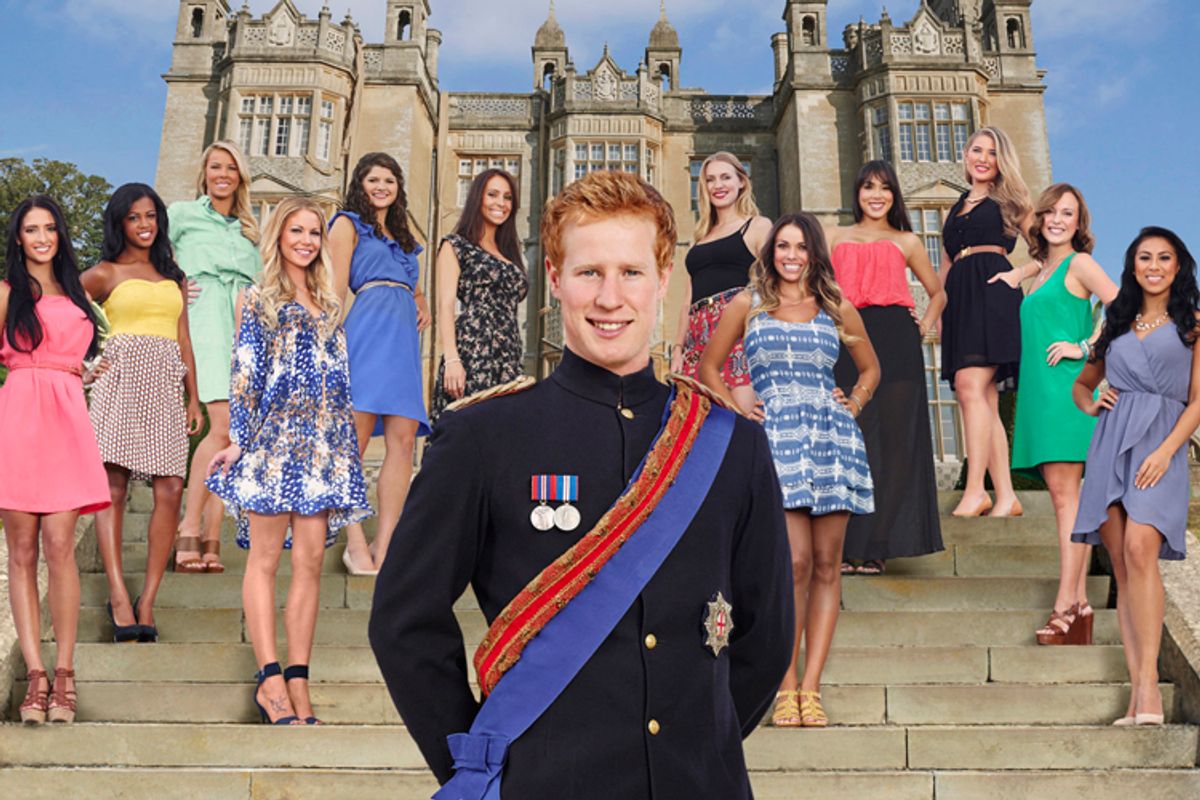At some point most people receive an email that says they’ve won the lottery or inherited a fortune or own shares they didn't know they'd bought in a blue-chip company. Then they adjust the settings on their spam filter and wonder who would believe it. Fox’s new reality TV dating show, "I Wanna Marry Harry," has a similar effect. The premise of the show is spammy: 12 American women are invited to compete for the affections of a British man called Matt Hicks, who they are supposed to believe is Prince Harry. The ruse plays out offline, but everything is faked. We are shown Matt Hicks getting a Harry-ish strawberry tint washed through his hair, and the historic country house, where he hosts a masquerade ball, is frequently hired out for filming. And like spam, the show offers too much -- wealth, fame, royal status -- too easily. So the question it raises is: Who would believe it?
Certain forms of romantic scams -- in which one person pursues a romantic relationship using a fake identity or under false pretenses -- are clearly not impossible to believe. Online dating fraud is now so common that in February this year the FBI issued a set of guidelines with the title “Looking for Love? Beware of Online Dating Scams” in preparation for Valentine’s Day. Trading on images of famous people is a risky strategy, but apparently a widely used one. One of the FBI’s warning signs is that your date “sends you a photograph of himself or herself that looks like something from a glamour magazine.” The Australian government’s Competition and Consumer Commission also says you should be worried if “you meet someone on an internet dating website and their profile picture or photograph looks ... like it’s from a magazine.” Last year, the Financial Times found that for victims of online romance scams in the U.S., “the average financial loss ... is between $15,000 and $20,000.”
In "I Wanna Marry Harry," Matt Hicks doesn’t ask any of the contestants for money, and he says that he is posing as Harry because he wants to find love. The explanation he gives for taking part in the show is confusing, because he seems to be pursuing two completely contradictory aims. "I have to convince them that I am Prince Harry,” he says with a sense of duty that sounds very House-of-Windsor, “but the goal is for them to like me for who I am." In this, he is acting more like someone filling out a profile on an online dating site. From one point of view, he is being flagrantly dishonest, but he is also creating a persona that allows him to approach people he wouldn’t otherwise approach, and hopes that something will develop.

Do the women competing for faux-Harry’s affections believe that he is Harry? It’s possible that they don’t but they enjoy pretending to believe it, because dating a convincing version of Prince Harry is somehow better than dating someone who isn’t Harry at all. In last night’s episode, none of the women confronted him about his identity, though one contestant would only say when asked that she hoped it was true. If they have seen "Joe Millionaire" -- a show that was made by the same production company as "I Wanna Marry Harry" with the same premise, except that the suitor posed as a millionaire instead of Prince Harry -- then they will suspect what we know and what Matt Hicks knows. The winning contestant will also know that when Harry is revealed to be a normal man at the end of the season, she will be rewarded for claiming that she is willing to date him without the money or title she thought he had.
As it builds toward the moment of revelation, "I Wanna Marry Harry" tries to look like a carefully staged morality play. But dating shows in the past haven’t asked their participants to doubt one another’s intentions and identities so thoroughly. Nor have they asked couples to engage in such complicated and extended role-playing. The format of Cilla Black’s "Blind Date" is an exercise in openness and simplicity by comparison. On that show, which ran on British television from 1985 to 2003, a woman on one side of a wall asks three men on the other side some questions, and selects one of them to join her on an expensive vacation with lavish spending money. "Blind Date" showed couples working out whether they were compatible; "I Wanna Marry Harry" asks whether they can trust one another and whether they have sound motives.
Reality TV is always less about the morality of its few participants than it is about the interests and desires of the viewers who outnumber them. What "I Wanna Marry Harry" really stages is the dance of constructed identities constantly playing out in the world of social media and dating apps -- the complicated relationships in which self-reinvention can be harmless and fun, or occasionally a case for the FBI. After all, no one wants to date a spammer.

Shares